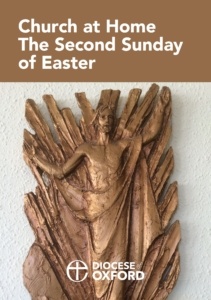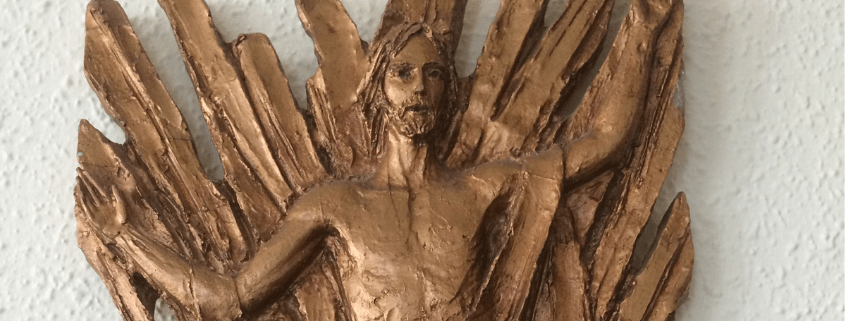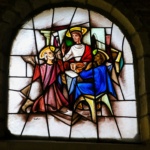Bishop Olivia gave the following sermon during a Church at Home online service.
The Sunday after Easter is known as Low Sunday. In early Christian times it marked the end of the ceremonies surrounding the Easter baptisms, and also the end of the Octave – the eight days of feasting which are kicked off on Easter Sunday. I have to say that the Easter eggs in our house didn’t last nearly that long!
But Low Sunday doesn’t mean that Easter is over. Eastertide lasts for 40 days – right up until Ascension. And that is important because it takes time to absorb a new truth, a new reality, and to learn to live differently.
There’s a sense that those who saw Jesus alive after his crucifixion were not sure how to react: with joy or with fear. In Mark’s gospel, they simply fled from the tomb and said nothing to anyone.
We need to stay with that sense of joy and fear, of amazement, of caution, and of beginning to dare to feel that it is true. Belief is something which, for most of us, is not an instantaneous thing, it’s more of a process, a gradual coming round, a questioning acceptance. And for those early disciples, and for us, a slowly dawning realisation that everything has changed. It took time.
There is a great deal of disbelief in the Gospel accounts of the resurrection. Mary Magdalene, the first Apostle, the first disciple to be told by Jesus to ‘go and tell’ she was disbelieved; the two disciples in Mark’s gospel who saw Jesus on the road were disbelieved; and here is dear Thomas, famously refusing to give any credence to these ridiculous fanciful tales unless he sees the marks of crucifixion himself. Jesus totally got this when he said to Thomas Have you believed because you have seen me? Blessed are those who have not seen, and yet have come to believe.
Those who have come to believe. When I was much younger, I had quite a long period of discounting much of Christianity because I simply could not sign up to believing that someone could come back to life after death. I found it literally incredible, and I thought that no-one who had an ounce of intelligence could seriously base their life on this belief. But, over time, as Jesus said, I came to believe. My reluctance was overcome, not by well-reasoned argument, or cleverly written books, but by looking around me and seeing people I loved and respected, and knew to be very intelligent saying yes, this is what I believe.
What difference does it make? The belief that Jesus is indeed risen from the dead is life-changing. It leads to a different way of looking at life, and at death. We slowly come to realise that everything that we thought about the world has changed. Our values turn upside down and our timeframe shifts and tilts.
None of us is unaware of what our world and our country are going through at the moment. Familiarity, reassurance is not what is being given to us this Easter. Certainty is not being given to us. This Easter, it’s hard to feel that we have a celebration of joy, new life and freedom when our freedom is constricted, sickness, death and grief are all nearby. It almost feels as though we are still in Good Friday.
What’s being given to us is change, confusion and disruptive newness. Very much like the early followers of Jesus. And some of us don’t deal very well or adapt very quickly to these things. But in the midst of it all, we are discovering new things about ourselves and about what matters. Ask yourself;
What is it you miss at the moment, and is it the same as what you expected to miss?
What do you long for? What is the thing that would make you happiest?
And was there something which you used to think was really vital, which you now find you are doing fine without?
It is important to reflect on these things, amid the strangeness and confusion of our changed lives, lived inside and, for many of us, online, and for many more, alone.
So we are shut-in, and we’re re-evaluating. And we’re realising what is important. I would like to think that we’re being more contemplative, more compassionate and more courageous. And if this time has anything to teach us, it is that after it is over, we mustn’t be pulled by the undertow back into the complacency of life as it was before. There are things that need to change.
We have come to value being there for each other and have seen the need to work together for the good of all. We have come to realise that the people who are rewarded the least in our society are the very people we rely on for the delivery of the basics of life: the shelf stackers, the refuse collectors, the care staff, the nurses and other NHS workers, the shop staff and the bus drivers. Brought into sharp focus is that poorer families have less space and no gardens. People who are confined together in small spaces will have less good mental health and are at a greater risk of violence. And having no home is a greater risk still.
When we are able to get back to normal, if the old normal even still exists, there are things that need to change, because how it was isn’t good enough, and isn’t how it ought to be. How can we shape the new normal, after COVID in a way that reflects what we have come to believe in this journey through Eastertide; that acknowledges how very precious life is, and how very precious each individual person is? And how can we make sure that we succeed in this?
It takes repetition of the newness to keep us on the right track, because the undertow that pulls us back into the familiar is strong. We need to swim against it. It takes time to absorb a new truth, a new reality, and to learn to live differently. This is the beginning of our Easter journey, and it starts with each one of us, where we are, now as we embrace the belief that Jesus is indeed risen from the dead and that changes everything.
Bishop Olivia
Low Sunday, 2020
 Watch the Church at Home on on the Second Sunday of Easter service here. Details of our Church at Home services, together with a listing of parish live streams can be found on the Diocesan website.
Watch the Church at Home on on the Second Sunday of Easter service here. Details of our Church at Home services, together with a listing of parish live streams can be found on the Diocesan website.



